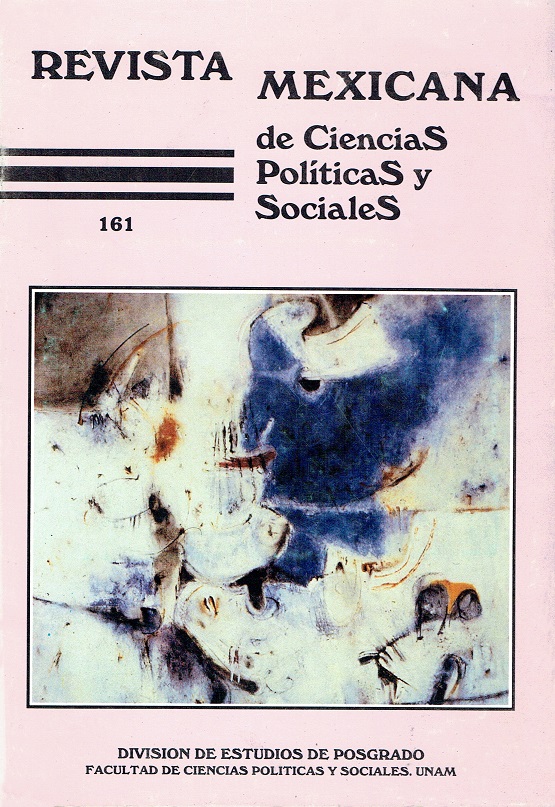¿Qué es el decisionismo? Reflexiones en torno a la doctrina política de Carl Schmitt
Main Article Content
Abstract
This essay is a critique of the so called “decisionist” theory by Carl Schmitt, first expounded on his main political works during the Weimar period. The author explains that Schmitt's idea of “decisionism” is not, as it has often been pondered a simple variant of ethical voluntarism associated with both existentialist and positivist moral philosophies.
“Decisionism” is a particular political doctrine based on the claim that the state is the absolute source of legal and moral decisions in political life. From this perspective, the author demonstrates that Schmitt’s “decisionism" is a purely negative doctrine, based on the symmetrical negation of all the political values of liberalism.Downloads
Article Details
Citas en Dimensions Service
References
Bendersky, Jospeh, Carl Schmitt: Theorist for the Reich, Princeton, Princeton University Press, 1983.
Bendersky, Jospeh, “Carl Schmitt and the Conservative Resolution”, Telos, no. 72, Summer, 1987, pp. 27-42.
Bonvecchio, Claudio, Decisionismo: La Dottrina Politica di Carl Schmitt, Milano, Unicopli, pp. 175-189.
Cohen, Jean and Arato, Andrew, Civil Society and Political Theory, Cambridge, MIT Press, 1992.
Cortés, Juan Donoso, “Discurso sobre la Dictadura”, Obras de Juan Donoso Cortés, 2 vols., Madrid, Biblioteca de Autores Cristianos, 1982.
Dotti, Jorge E., “El Hobbes de Schmitt”, Cuadernos de Filosofía, núm. 32, año 1989, pp. 57-71.
Habermas, Jürgen, “Dogmatism, Reason and Decision: On Theory and Practice in a Scientific Civilization”, Jürgen Habermas on Society and Politics: A Reader, Boston, Beacon Press, 1989.
Habermas, Jürgen, “The Horrors of Autonomy: Carl Schmitt in English”, The New Conservatism: Cultural Criticism and the Historian’s Debate, Cambridge, MIT Press, 1992.
Herf, Jeffrey, Reactionary Modernism, Cambridge, Massachusetts, Cambridge University Press, 1984.
Hirs, Paul, “Carl Schmitt Decisionism”, Pelos, no. 72 (1987).
Hobbes, Thomas, Leviathan, edición e introducción de C.B. Macpherson, New York, Penguin, 1985.
Kennedy, Ellen, “Carl Schmitt and the Frankfurt School”, Telos, no. 71, Spring, 1987, pp. 37-66.
Koselleck, Reinhart, Critique and Crisis: Enlightenment and the Pathogenesis of Modem Society, Cambridge, mit Press, 1988.
Muller, Jerry Z., “Carl Schmitt, Hans Feyer and the Radical Conservative Critique of Liberal Democracy in the Weimar Republic”, History of Political Thought, vol. xii, no. 4, Winter, 1991, pp. 695-715.
Neumann, Franz, “Approaches to the Study of Political Power”, The Democratic and the Authoritarian State, New York, Free Press, 1957.
Nietzsche, Friederich, On the Genealogy of Morals, New York, Random House, 1989.
Sartori, Giovanni, “The Essence of the Political in Carl Schmitt”, Journal of Theoretical Politics 1 (1), 1989.
Schwab, George, “Enemy or Foe: a Conflict of Modern Politics”, Telos, no. 72, 1987, pp. 194-201.
Schwab, George,The Challenge of the Exception: Introduction to the Political ideas of Carl Schmitt between 1921-1936, New York, Greenwood Press, 1989.
Schmitt, Carl, The Concept of the Political, traducción e introducción de George Schwab, New Jersey, Rutgers University Press, 1976. En castellano: El Concepto de lo Político, Buenos Aires, Folios, 1985.
Schmitt, Carl, The Crisis of Parliamentary Democracy, traducción e introducción de Ellen Kennedy, Cambridge, mit Press, 1988.
Schmitt, Carl, El Leviathan en la Teoría del Estado de Thomas Hobbes, Buenos Aires, Struhart, 1990.
Schmitt, Carl, La Dictadura, Madrid, Alianza Editorial, 1985.
Schmitt, Carl, Political Romanticism, traducido y con introducción de Guy Oakes, Cambridge, Massachusetts, MIT Press, 1986.
Schmitt, Carl, Political Theology: Four Chapters on the Concept of Sovereignty, traducción e introducción de George Schwab, Cambridge, MIT Press, 1988. En castellano: Teología Política, Buenos Aires, Struhart & Cía., 1985.
Ulmén, G.L., “Return of the Foe”, Telos, no. 72, 1987, pp. 187-193.
Weber, Max, “Politics as a Vocation", en From Max Weber: Essays in Sociology, traducción, edición e introducción de H.H. Gerth and C. Wright Mills, New York, Oxford University Press, 1958.
Weber, Max, The Protestant Ethic and the Spirit of Capitalism, New York,
Routledge, 1992.
Wolin, Richard, “Carl Schmitt: The Conservative Revolutionary Habitus and the Aesthetics of Horror”, Political Theory, vol. 20, no. 3, August 1992.
Wolin, Richard, The Politics of Being: The Political Thought of Martin Heidegger, New York, Columbia University Press, 1990.

La Revista Mexicana de Ciencias Políticas y Sociales publicada por la Universidad Nacional Autónoma de México se distribuye bajo una Licencia Creative Commons Atribución-NoComercial-SinDerivar 4.0 Internacional.
Basada en una obra en http://www.revistas.unam.mx/index.php/rmcpys/
La RMCPyS autoriza a sus colaboradores que suban una copia de sus trabajos publicados en sus webs personales o en cualquier repositorio de acceso abierto, siempre y cuando se mencione específicamente a la Revista Mexicana de Ciencias Políticas y Sociales como fuente original de procedencia, citando el año y número del ejemplar respectivo y añadiendo el enlace a la página web donde este órgano editorial puede ser consultado in toto, de manera abierta y gratuita en: <www.revistas.unam.mx/index.php/rmcpys>.
Las y los lectores tienen libertad para:
Compartir, copiar y redistribuir el material en cualquier medio o formato.
El licenciante no puede revocar estas libertades en tanto usted siga los términos de la licencia.
De acuerdo con los siguientes términos:
- Atribución: la/el lector/a debe reconocer el crédito de una obra de manera adecuada, proporcionar un enlace a la licencia, e indicar si se han realizado cambios. Puede hacerlo en cualquier forma razonable, pero no de forma tal que sugiera que tiene el apoyo del licenciante o lo recibe por el uso que hace.
- No comercial: la/el lector/a no puede hacer uso del material con fines comerciales.
- Si se mezcla, transforma o se desarrolla a partir de la obra licenciada, no se permite la distribución del material modificado.
Cargos por gestión de artículos
La Revista Mexicana de Ciencias Políticas y Sociales NO cobra tarifas por recibir, procesar o publicar los artículos (Article Processing Charge [APC]) enviados por los autores.





